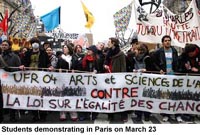Students and workers demand repeal of jobs law in France
Students barricaded schools, workers walked off the job and protesters galvanized Tuesday for what they hope is their biggest show of strength yet to demand repeal of a jobs law that has riven the country. Strikes snarled air, train and public transport and highways. Parisian commuters flattened themselves onto limited subway trains. Garbage bins in some Paris neighborhoods stood overflowing and uncollected by striking sanitation workers. Passengers at Paris ' Orly Airport showed up hours early, girding for delays. Irish budget airline Ryanair canceled all its flights in and out of France .

Protesters have mounted ever-larger, and at times bloody, demonstrations for two months against a law that makes it easier to fire young workers. Yet President Jacques Chirac signed it anyway Sunday, saying France needs the law to keep up with the world economy. He offered modifications to the law but students and unions rejected them, saying they want the law withdrawn, not softened. "What Chirac has done is not enough," said 18-year-old Rebecca Konforti, among a group of students who jammed tables against the door of their high school in southern Paris to block entry Tuesday. "They're not really concessions, he just did it to calm the students."
Some 150 marches were planned Tuesday in cities nationwide, though the afternoon rally in Paris promised to be the biggest. Unions hope to match a similar action last week that brought at least 1 million people to the streets. The capital was deploying 4,000 police in preparation. Previous demonstrations have degenerated into melees with rioters hurling concrete and police spraying tear gas and water cannons.
"We are on the edge of victory," said Bruno Julliard, head of a leading students' union, on France Inter radio on Monday. Prime Minister Dominique de Villepin devised the disputed "first job contract" as a bid to push France into the global economy and stem youth unemployment. He maintains it would encourage hiring by allowing employers to fire workers under 26 during their first two years on a job without giving a reason.
Critics say it threatens France 's hallmark labor protections, and their fury has devastated the suave and determined Villepin. The government appeared to be hoping that protests would die down after Tuesday's big event, and was looking to possible future talks between more moderate unions and Interior Minister Nicolas Sarkozy. Sarkozy, a leading presidential hopeful, has offered to broker dialogue and is the only government official unscathed by the crisis.
Train and public transport were disrupted Tuesday in Marseille, Lyon , Bordeaux and in Alsace in the east. Two high-speed trains in three were running in many regions, according to rail operator SNCF. The airport in Corsica 's capital, Bastia , closed for the day. A tobacco vendor in southern Paris grumbled that street cleaners were on strike in his neighborhood, but many shrugged off the delays, accustomed to France 's frequent strikes. Many workers stayed home out of solidarity with the protesters and many others stayed home because they took vacation days to avoid the inconveniences of the walkout.
When Chirac signed the law Sunday he urged that it not be applied until a new, softer version is devised with two key modifications that take opponents' concerns into account. Protesters said modifying the law was not enough. Union and student representatives have said talks were possible with lawmakers from the ruling UMP party but reiterated their insistence that the contract be repealed, reports the AP.
N.U.
Subscribe to Pravda.Ru Telegram channel, Facebook, RSS!


